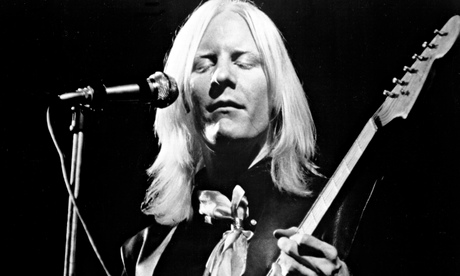
'Authentic': Johnny Winter circa 1970. Photograph: Michael Ochs Archives
Through the rain of summer in Somerset came a sound the likes of which I had never heard before, from a long-haired albino with a limp and squint, and his guitar: "Two, three, fah," he had mumbled, before unleashing a vortex of electric blues. This was Johnny Winter's first gig in the UK, the 1970 Bath festival, and I was mindful to catch his second, at the Albert Hall, supporting Santana.
These were the days when the blues were an infinite adventure – I had seen the masters play: Son House, Bukka White. The discourse was why these Delta legends could get gigs in England, worshipped by John Mayall and Eric Clapton, while back home they barely played beyond the shotgun shacks of Mississippi. There were, however, three disciple exceptions to this British reinvention of the blues: Elvin Bishop, Michael Bloomfield – and Johnny Winter.
There was nonsense about who was "the best" of the white bluesmen; it was a question of whose records one played mo st, whose bootlegs one amassed, who one saw at every half-opportunity – in my case, that was Johnny Winter.
Much was written about Johnny playing "heavy blues", but this derided his genius. What enthralled me at Bath were the constant key shifts and phrasing that stopped the heart, whether at amphetamine velocity or a searing dirge.
He insisted on playing authentic raw blues – and put whisky and drugs before fame and fortune, costing him the superstardom that took Clapton and others towards muzak and Surrey. Instead, Johnny toured and played relentlessly to those who really knew their stuff; until last week, I would drool enviously over the dates: small venues across America and Europe, night after night, months on end (Britain didn't seem to get it, therefore didn't much get much of him).
Film-maker Jon Brewer describes an interview with Johnny for his masterly film about BB King: "When we arrived with the crew, he was there in Texas, in a pair of underpants, chaos in the house. His wife insisted: 'Johnny, you must change for the film.' He disappeared reluctantly and came back in a pair of trackies."
I heard from BB himself how Johnny had been among the first group of four white people who came to hear him play – in Chicago. BB was worried they were from the I RS, come to check up on his tax affairs (anyone looking less less like a US government agent than Johnny Winter it is hard to imagine). "One of them was very white and asked to sit in," recalled the master. "I thought, OK, let's see who this kid is. So I played real difficult, changing keys, tempi – but he kept up; he was pretty good." Johnny Winter was the black bluesman's white bluesman – as great a producer of Muddy Waters as he was a musician himself.
I caught him in Tucson a couple of years ago, and more recently his last two gigs in England: at Frome's Cheese and Grain – a few miles from the muddy field of 1970 – and Shepherd's Bush Empire. He stared, apparently unseeing, from beneath the brim of his cowboy hat into the middle distance, stone-still but for the ferment in his fingers and tattooed, pencil-thin forearms.
I submitted a review of the latter, dumbstruck by the increased intensity of Johnny's performance – but also b y the encore: not the usual Highway 61 Revisited or It's All Over Now, but Elmore James's Dust My Broom and its now poignant line: "I believe my time ain't long." I've felt a chill ever since, waiting for last week's news and listening as I do – now, for ever more on LP only – to Johnny Winter's cyclone in blue.
No comments:
Post a Comment